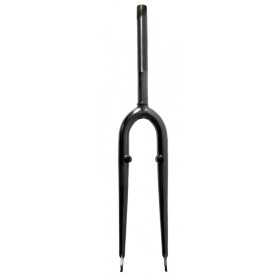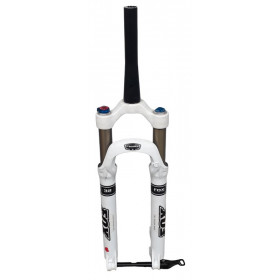-
 New product
New product -
 More detailsUsed Out-of-StockFox 32 RL fork 26 inches
More detailsUsed Out-of-StockFox 32 RL fork 26 inches- €229.99
Showing 1-2 of 2 item(s)
MTB forks for 26 inch bikes are common for older bikes, compact mountain bikes and fat bikes. Although they have largely been replaced by larger wheel sizes (27.5" and 29"), 26" forks remain popular for specific disciplines or for riders who prefer the increased agility and maneuverability that offers a smaller diameter wheel. These forks offer a wide variety of options in suspension, travel and materials to meet the needs of different ridings, from cross-country to downhill.
Characteristics of 26 inch bicycle forks
1. Suspension and damping:
- The 26-inch forks are available in rigid, air-suspended or spring-suspension versions.
- Spring suspension forks: Less light, but resistant and well suited to rough terrain, they provide solid absorption for major shocks.
- Air forks: Lightweight and adjustable, these are particularly popular for cross-country riding, as they allow the stiffness to be customized based on the rider's weight and terrain.
- Rigid forks: Without suspension, ideal for disciplines such as gravel, fat biking, or for outings on mixed terrain.
2. Travel:
- The travel of the 26-inch forks varies depending on the intended use.
- 100 to 120 mm: For cross-country and touring, with a good balance between absorption and pedaling efficiency.
- 130 to 160 mm: For trail and all-mountain, offering better shock absorption and more comfort on technical terrain.
- 160 mm and above: For enduro and downhill, where absorption of large shocks is essential for safety and comfort on intense descents.
3. Manufacturing materials:
- Aluminum: Commonly used for fork sliders, aluminum is light and durable, offering a good compromise between weight and strength.
- Carbon: Used in high-end cross-country forks, it allows significant weight savings for better handling, but it is less common in 26-inch forks.
- Steel: Strong and reliable, although heavier. Steel forks are sometimes preferred for rigid gravel or fat bikes thanks to their strength.
4. Advanced settings:
- Modern 26-inch forks feature multiple settings to fine-tune the suspension to the rider's preferences.
- Compression: Adjusts the harshness of the suspension during an impact, with low and high speed compression options.
- Rebound: Controls the speed at which the fork returns to its initial position after an impact, essential for rough terrain where control is essential.
- Preload: For spring forks, this adjustment allows the suspension to be adapted to the rider's weight.
5. Suspension lock:
- Some forks offer a lockout that locks the suspension for better performance on rising or flat sections. This system is particularly practical for long hikes or routes that include uphill portions.
6. Brake and head tube compatibility:<:h3></li/
- >Brakes: 26-inch forks are often compatible with disc brakes, the current standard for mountain bikes. Some older or specific models can also accommodate rim brakes (V-brakes).
- Headtube: Common diameters are 1"1/8 or 1"1/2, but some modern forks have a tapered column (1"1/8 top, 1"1/2 bottom) for more rigidity and better fit.
Advantages of 26 inch forks
1. Increased maneuverability:
The 26-inch wheel is more responsive than larger sizes, making it an ideal choice for tight, technical terrain.
2. Agility and reduced weight:
26-inch forks are often lighter, ideal for cyclists looking for speed and good maneuverability on the trails.
3. Adaptability to varied practices:
- From cross-country rides to technical descents, 26-inch forks offer a wide range of options for different practices.
Specific features of 26-inch forks by type of practice
1. Cross-Country (XC):
Travel from 80 to 120 mm for optimal pedaling efficiency.
Lightweight forks, often with air suspension, with lockout for climbs.
2. Trail and All-Mountain:
- Travel of 120 to 150 mm to absorb shock and provide comfort on varied trails.
- Robust construction for impact resistance while remaining lightweight.
3. Enduro and Downhill:
- Travel of 160 mm and more, often reinforced for technical terrain and steep descents.
- Double T (double bridge) system for descent, offering increased strength and control.
4. Gravel and Fat Bike:
- Rigid or short travel forks to improve control in mixed terrain and support wider tires.
- Robust and designed to adapt to sandy, snowy or rocky terrain.
In summary
The 26-inch forks are ideal for cyclists looking for maneuverability, lightness and good control on technical terrain. They remain a reliable and effective choice for mountain bike enthusiasts who favor compact bikes, or for fat bike and gravel riders. With a variety of travel and adjustments, they meet the needs of modern mountain biking disciplines while offering excellent quality-to-weight ratio.